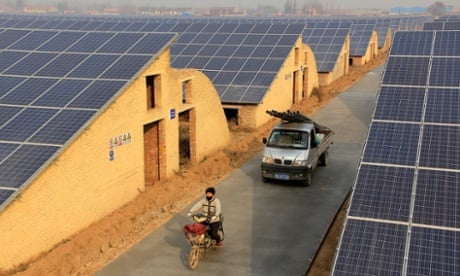 |
| Smog in Delhi (Photograph: Prakash Singh/AFP/Getty) |
The economic benefits for a country from tackling climate change easily outweigh the costs, according to a study that seeks to highlight the incentives for individual nations to take urgent action to cut emissions.
Countries stand to gain more than they would lose in economic terms from almost all of the actions needed to meet an agreed global warming limit of no more than 2C above pre-industrial levels, according to the paper published by two research institutes at the London School of Economics.
It is the latest research to underscore the apparent economic gains from limiting emissions, which include new jobs and improved health, even before the benefits of preventing dangerous climate change are taken into account.

“The majority of the global emissions reductions needed to decarbonise the global economy can be achieved in ways that are nationally net-beneficial to countries, even leaving aside the ‘climate benefits’,” says Fergus Green in his paper for the Grantham Research Institute on Climate Change and the Environment and ESRC Centre for Climate Change Economics and Policy at the LSE.
He cites improved air quality, increased energy efficiency and better energy security among the potential benefits to individual countries that more than justify the costs of cutting carbon emissions.
Furthermore, investments in low-carbon energy are likely to be more than paid back by the falling cost of renewable sources, such as solar and wind, and by reduced spending on fossil fuels, Green predicts.
“All things considered, I conclude that there is a very strong case that most of the mitigation action needed to stay within the internationally agreed 2°C limit is likely to be nationally net-beneficial,” adds Green, who is also research adviser to the economist Lord Stern, author of an influential study on climate change.
The world’s nations have agreed that 2C is the maximum safe limit for a rise in global temperatures. Currently, the world is heading for a catastrophic 5C of warming and the deadline to seal a global climate deal comes in December at a crunch UN summit in Paris. It will be the first significant attempt to reach a worldwide consensus on global warming targets since the infamously chaotic UN summit in Copenhagen in 2009.
In the run-up to the meeting, the new paper warns countries against assuming they can, or should, look for a “free ride” on the efforts of other nations to tackle climate change. Green says that countries would gain by working together to bring down the costs of a transition to a low-carbon economy and sharing the benefits that such investment would deliver.
“The findings of this research suggest that the traditional assumption that action on climate change is net-costly is false. Those who think there is an incentive for countries to ‘free-ride’ on the climate protection provided by others are very much mistaken,” says Green.
“Countries should see the climate talks in Paris this December as an opportunity to work with each other to deliver as quickly as possible the mutual gains that can result from decarbonising the economy.”
The report’s conclusions echo those of the Nobel prize-winning economist Joseph Stiglitz, who used an address to a major science conference in the French capital last week to back the affordability for countries of tackling climate change.
“Creating a green economy is not only consistent with economic growth, it can promote economic growth,” he said, especially when there was a lack of demand in the global economy.
No comments:
Post a Comment